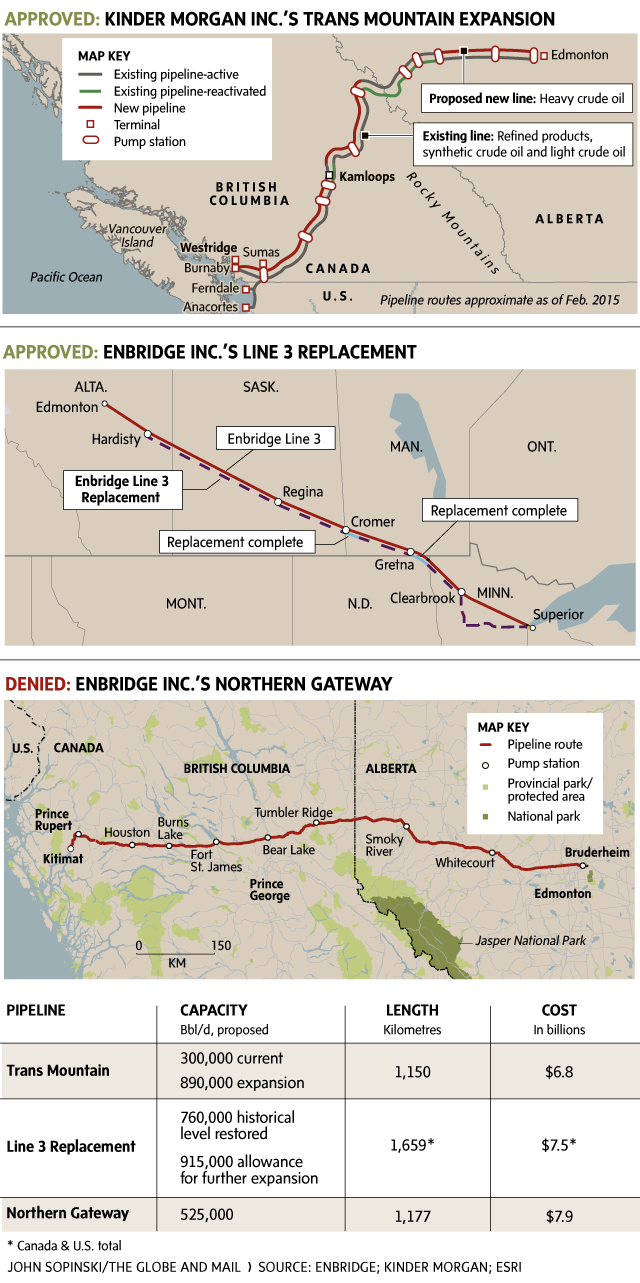Prime Minister Justin Trudeau gave a shot in the arm Tuesday to Alberta’s struggling oil industry by approving two major crude pipelines, a decision that provoked outrage from environmentalists, some First Nations leaders and B.C.’s Lower Mainland politicians.
At a news conference in Ottawa, Mr. Trudeau gave the green light to Kinder Morgan Inc.’s tripling of capacity on its Trans Mountain line to Vancouver, and Enbridge Inc.’s expansion of its main export line to the U.S. – a total of one million barrels a day of added export capacity from Alberta.
However, the Prime Minister indicated Enbridge’s long-stalled Northern Gateway pipeline through the Great Bear Rainforest will not proceed, and Ottawa will impose a moratorium on crude tanker traffic off the northern coast of B.C.
“We made this decision today because we are convinced it is in the best interests of all Canadians,” he said. “We heard clearly from Canadians that they don’t want to see someone trying to make a choice between what’s good for the environment and what’s good for the economy. They need to go together.”
The two approved pipelines would create 23,000 jobs during construction, bring additional revenue to federal and provincial coffers, and bolster a battered oil industry in Western Canada, the Prime Minister said.
After his news conference, Mr. Trudeau met with Alberta Premier Rachel Notley, who has argued the oil industry is the engine of her province’s economy and needs access to new markets in Asia. Ms. Notley is a key ally in Mr. Trudeau’s push for a pan-Canadian climate-change strategy, and the pipeline approvals will clearly help her defend her government’s adoption of a carbon tax and a cap on emissions from the oil sands by 2030.
Mr. Trudeau meets with provincial and territorial premiers next week with the aim to conclude an agreement on a climate-change strategy. In the face of skepticism from environmentalists, he insisted Tuesday the pipeline approvals are consistent with Canada’s commitment to reduce greenhouse gases by 30 per cent from 2005 levels by 2030.
“The Prime Minister is showing some extraordinary leadership today,” Ms. Notley said after the meeting. “Our province has been brutally slammed by the collapse of commodity prices and it has been a long dark night for the people of Alberta as a result. Today, we are finally seeing some morning light.”
But the Premier said the approvals do not represent a turn away from climate commitments. “To all Canadians, I say this: We don’t have to chose between the environment and building the economy. Canada is going to be a global leader on climate change and our country will create jobs and greater economic equality,” she told reporters.
The $6.8-billion Trans Mountain expansion poses a tough political challenge for Mr. Trudeau, who had promised during last year’s election to overhaul the environmental assessment process used to review it but then failed to do so. The Liberals won 17 seats in British Columbia in 2015 while taking only four in Alberta.
Opposition in the Lower Mainland of British Columbia to the project is fierce, as critics worry about spills from the pipeline, the substantial increase in tanker traffic in the harbour, and the rise in greenhouse-gas emissions from the oil sands. Two Vancouver-area Liberal MPs have publicly opposed the project, as do local mayors, Vancouver’s Gregor Robertson and Burnaby’s Derek Corrigan.
“I’m absolutely gobsmacked,” said David Suzuki, the prominent B.C.-based environmentalist who personally lobbied Mr. Trudeau against the project. Dr. Suzuki said the pipeline approvals – and oil sands expansion they will facilitate – represent a long-term commitment to bitumen production, and will make it impossible for Canada to meet its international climate-change commitments. Federal Green Party Leader Elizabeth May vowed to engage in civil disobedience to stop the project.
Some First Nations leaders are pledging to do “whatever it takes” to stop the Kinder Morgan project, raising fears of the kind of confrontation now occurring near South Dakota’s Standing Rock reservation over the Dakota Access pipeline project. The Squamish First Nation and the Tsleil-Waututh Nation have already indicated they will launch court challenges claiming inadequate consultation. “As the Harper government discovered, there’s a vast difference between approving a tar sands pipeline and actually getting it built,” said Grand Chief Stewart Phillip, president of the Union of B.C. Indian Chiefs. He noted that there is an alliance of 100 First Nations and tribes across North America “that are ready to do whatever it takes to stop these pipelines.”
Mr. Trudeau acknowledged the fierce opposition to the Kinder Morgan project, but said the government consulted widely, looked at the scientific evidence, bolstered marine-safety measures and concluded the project is in the national interest.
He said the two pipeline projects are consistent with Canada’s climate-change targets, though environmentalists will be watching to see whether the government releases a road map at next week’s first ministers meeting to show how it intends to meet the 2030 goal.
Conservative interim leader Rona Ambrose questioned whether the Liberals are committed to seeing the pipeline built, and criticized the decision to reject Northern Gateway, which had been approved by Stephen Harper’s government.
Oil industry executives were pleased with the decisions, though Enbridge expressed disappointment with the rejection of Northern Gateway.
Kinder Morgan Canada president Ian Anderson said the federal decision was “a defining moment for our project and Canada’s energy industry.” Once the company has met the 157 conditions set by the National Energy Board, Mr. Anderson expects to begin construction next September. Completion is slated for late 2019 – just when Mr. Trudeau will be going to the polls.
SHAWN MCCARTHY AND JEFF LEWIS – GLOBAL ENERGY REPORTER
OTTAWA AND CALGARY — The Globe and Mail
Published Tuesday, Nov. 29, 2016 4:53PM EST
Last updated Wednesday, Nov. 30, 2016 8:51AM EST

